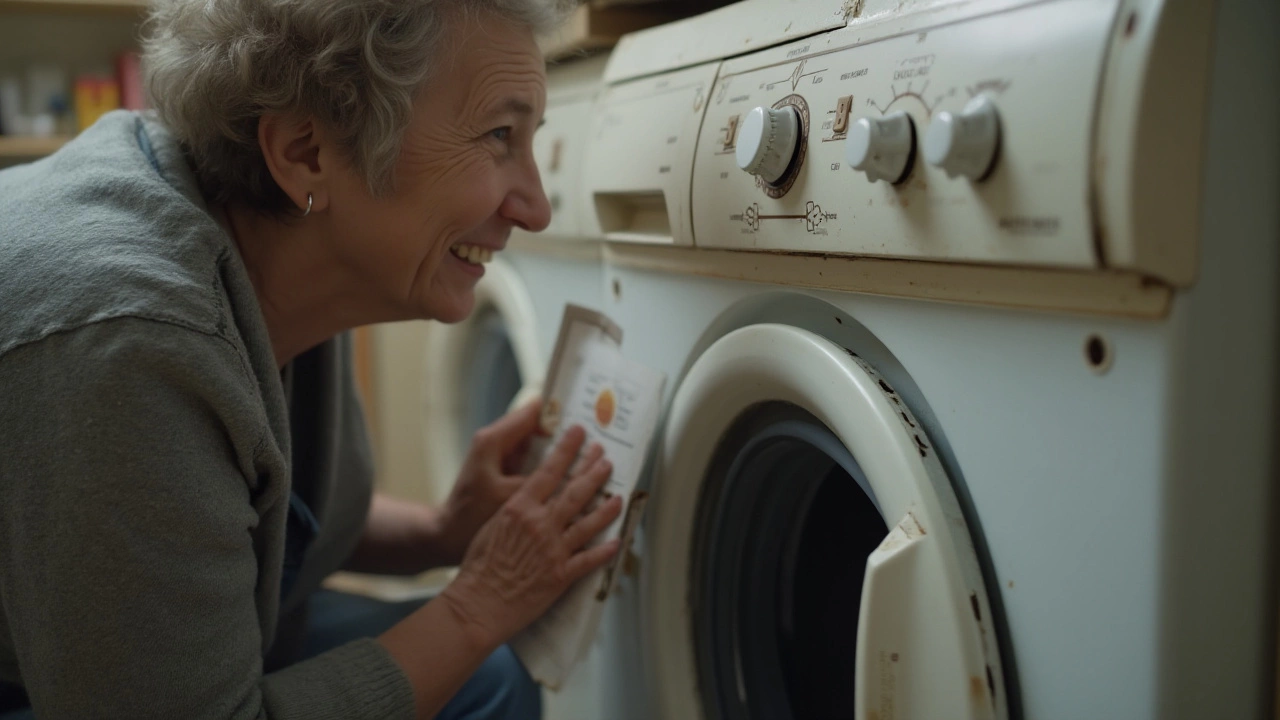Washing machines are one of the most essential appliances in the home, tirelessly working to keep our clothes clean and fresh. But have you ever wondered how long these household workhorses are actually supposed to last? Understanding the lifespan of your washing machine can help you plan for repairs or replacements and make informed decisions about maintenance.
In this article, we'll dive into the typical lifespan of washing machines, explore the factors that can influence their longevity, and share practical tips to help you extend the life of your washer. Whether you're a new homeowner or looking to extend the life of your trusted appliance, we've got the insights and advice you need to keep your machine humming along smoothly.
- Average Lifespan of Washing Machines
- Factors Affecting Longevity
- Extending the Life of Your Washing Machine
- Common Maintenance Tips
- Knowing When to Repair or Replace
Average Lifespan of Washing Machines
Washing machines have become an indispensable part of modern life, dutifully handling laundry loads week after week. It's natural to wonder just how long you can expect your trusty appliance to last. Generally, the average lifespan of a washing machine is about 10 years. This number isn't set in stone, as several factors such as brand, model, and maintenance habits can alter this time frame.
The longevity of washing machines has seen improvement over the years due to advancements in technology and design. Despite this, wear and tear are inevitable as the machine goes through countless cycles of soaking, agitating, and spinning. Front-loading machines might offer a slightly different lifespan compared to top-loaders, though the difference isn't often drastic. A well-maintained machine can exceed its expected life, while those neglected might reach the end of their useful days sooner than you'd hope.
"Regular maintenance is key to extending the life of your washing machine," says home appliance expert John McClennon. "Often, it's the little things like cleaning the drum and checking hoses that make all the difference over time."
It's interesting to note that some premium brands are known for crafting washing machines that often stand the test of time beyond the typical decade. This comes at a price, of course, but could be worth it if longevity and reduced need for repairs are high on your priority list. Another aspect to consider is the frequency of use. Households that are larger and do multiple loads a week could see a shorter lifespan than those who only run the washer sparingly. Balancing usage with regular preventative measures can help mitigate premature wear.
Age, however, is not the sole factor. Other elements such as the hardness of the water used, types of detergents, and how heavy the loads are can also contribute to how long a machine keeps running efficiently. Hard water, for instance, can lead to limescale build-up, which diminishes the efficiency and could hasten the machine's decline without the correct treatment. Therefore, a combination of these variables alongside basic maintenance practices plays a crucial role in determining a washing machine's lifespan.
Factors Affecting Longevity
When it comes to the lifespan of washing machines, several elements can sway how long these devices remain reliable fixtures in your home. Understanding these factors can be the difference between a decade of seamless washes and a quick trip to the appliance store. One of the leading components that determine the survival of your machine is the type you own. Generally, top-loading machines are known to last a bit longer than their front-loading counterparts. This is due to fewer mechanical complexes in their design, making them less prone to breakdowns caused by overloading or wear and tear on more intricate parts.
Another significant factor in determining how long your washing machine will last is the frequency of use. Like any diligent worker, the harder your washing machine works, the quicker it tires. Households with large families running multiple loads a day might find their machines wear out faster compared to those in smaller families. It's crucial to also consider water quality; hard water with high mineral content can lead to build-ups and increase the odds of requiring washing machine repair. Components like the drum, hoses, and filters are especially vulnerable to mineral deposits, so water softeners might be a worthwhile investment.
A fascinating fact that many might overlook is the impact of location. Washing machines in basements, often exposed to longer periods of humidity, may suffer from rust issues faster than those located in better-ventilated laundry rooms. The maintenance traditions you follow also play a critical role in the health of your washer. Machines that are routinely cleaned, checked for leaks, and executed with balanced loads tend to outlast their neglected counterparts. According to a report by Consumer Reports, "Regular maintenance, almost like taking your washing machine for a health check-up, can extend its functional lifespan considerably."
"Regular servicing not only enhances the performance efficiency of washing machines but also serves as a proactive measure against unexpected breakdowns," states appliance expert Sarah Lin at the National Appliance Warehouse.
Material components of your appliance make a stark difference too. Machines with durable stainless steel tubs may endure the daily grind a lot longer than those with plastic interiors, which can crack and weaken over time. Additionally, using the correct detergent and following the manufacturer's recommendations can prevent unnecessary strain on your machine. Overuse of detergent often creates excessive suds, which may lead to longer rinse cycles, eventually wearing down the motor. Thus, understanding these critical factors help in extending the appliance care routine and ultimately, its longevity, providing you with continuous service while saving you from unwarranted expenses and repairs.

Extending the Life of Your Washing Machine
Extending the life of your washing machine isn't just about saving money—it's also about reducing waste and practicing sustainability. A well-maintained washer can last significantly longer than one that's neglected, and fortunately, keeping your machine in peak condition doesn't require a lot of expertise. Regular maintenance can help you avoid unexpected breakdowns and ensure that your machine operates efficiently throughout its lifespan. With a little attention to detail and consistency, you can promote longevity and maintain performance.
A fundamental step in prolonging your washer's life is to regularly clean it although it may seem unnecessary for an appliance designed to clean other things. Detergent, lint, and mineral residues can build up over time, leading to unpleasant odors and diminished performance. Every few months, running an empty cycle with hot water and a cup of white vinegar or a commercial washing machine cleaner can help eliminate these residues. Pay close attention to the detergent drawer and rubber gaskets, which can trap moisture and grime, making them prone to mold and mildew growth.
Another critical component of washing machine maintenance is the proper loading technique. Overloading your washer can strain the motor and suspension, leading to accelerated wear and potential damage. Aim to load your machine with care, avoiding cramming clothes in until they're tightly packed—your washer operates most efficiently when there's space for the water and detergent to circulate freely. Conversely, underloading can also be problematic, as it might throw the machine off balance during spin cycles, causing undue stress on the components.
According to appliance experts at Consumer Reports, "Properly caring for your washer is the equivalent of nurturing a long-term relationship; it requires consistent attention, minimal effort, and results in significant long-term benefits."
Periodic checks and adjustments can further enhance the longevity of your appliance. Make it a routine to inspect hoses and connections for any signs of wear or leaks, replacing them if necessary to prevent water damage or inefficiencies. Ensuring your washer sits level on the floor helps distribute the machine's weight evenly, reducing the risk of excessive vibration and noise, which can shorten its lifespan. Using a spirit level, adjust the feet of your machine to achieve stability, counteracting the effects of an uneven floor.
Energy Conservation and Smart Usage
One cannot emphasize enough the role energy conservation plays in the life of home appliances. Being conscious of water temperature settings can make a difference; using cold water for most washes not only saves energy but also reduces the risk of wear on your washer's heating elements. Similarly, consider investing in energy-efficient models, which are designed to use less water and electricity while maintaining effective cleaning power. These machines often come with advanced features that also reduce mechanical strain, contributing to a longer operational life.
With technological advancements, some modern washers are equipped with diagnostic features that can alert you to potential issues before they become significant problems. Familiarizing yourself with these features can give you a head start on dealing with minor issues, preventing costly repairs in the future. Regular maintenance checks, motivated by vigilance and understanding of your machine, can ease your homeowner's worries. By giving your washing machine the care and attention it deserves, you ensure it continues to serve your household efficiently for years.
- Run an empty cleaning cycle every three months.
- Avoid overloading and underloading your washer.
- Check and replace hoses regularly to prevent leaks.
- Use stable, level ground positioning for your machine.
- Embrace energy-efficient features and settings.
Common Maintenance Tips
Regular maintenance can significantly extend the lifespan of your washing machine while ensuring it operates efficiently. Most experts agree that simple habits can make a big difference. First, it's important not to overload your washer. When your washing machine is stuffed to the gills, it struggles to spin and clean effectively, leading to unnecessary strain on the motor and drum. Equally crucial is the type of detergent used. High-efficiency washers require less suds, so using a detergent designed specifically for these machines can prevent issues like build-up in the drum. This small step helps avoid major headaches down the road, keeping the machine in peak condition for years.
Maintaining a balanced load is another crucial step. An unbalanced load can cause the machine to shake vigorously during the spin cycle, potentially leading to damage. In addition to evenly distributing laundry, ensure you're using the appropriate settings for the materials you're washing. Use the delicate cycle for lighter garments and linens, and avoid the temptation to speed through a wash on a harsh setting. And remember to wipe down the rubber gasket around the door—particularly in front-loading machines—since it can accumulate grime and mold over time, impacting how well the door seals and the machine's overall functionality.
"A well-maintained washing machine can last up to 14 years, while a poorly kept one might give up in just a few years," advises Tom Sleight, a veteran appliance repair technician with over 30 years of experience in the field.
Another significant measure is to regularly clean the washing machine, not just the drum but also pipes and filters. A monthly maintenance cycle, or a self-clean cycle if available, with a mixture of vinegar and baking soda can help break down residue and kill bacteria. Paying attention to the inner workings, such as hoses, ensures that there are no leaks or clogs which might escalate into severe plumbing problems. Moreover, it’s essential to keep the outside clean. Dusting off the vent openings ensures proper air circulation, preventing the motor from overheating.
It's also wise to leave the door open after each wash for a short while to allow air to circulate and dry out the drum, reducing the risk of mildew. Paying attention to unusual noises or movements can alert you to underlying problems. Often, these are the first signs that something needs adjustment or repair. Regular checks even help you evaluate whether certain repairs can be performed at home or require professional services. By staying vigilant, you can often catch small issues before they blossom into costly repairs.
Consider an annual professional inspection if you want to ensure all internal parts remain in good condition. This step is especially beneficial if you often wash heavy items like blankets or jackets, which may put additional strain on the machine. Thoughtful practices like these safeguard the investment in your appliance, rewarding you with years of reliable service and a reduced carbon footprint by keeping your machine out of landfills longer.

Knowing When to Repair or Replace
Making the decision to repair or replace your washing machine can feel like solving a complex puzzle, but it doesn’t have to be daunting. Generally, a well-maintained washing machine lasts about 10-15 years. If your appliance is nearing the end of this range or showing signs of wear, the choice becomes imminent. Frequent breakdowns or increasingly expensive repairs are telltale signs that it might be time to consider picking a new model. When evaluating your options, cost is a crucial factor. For an older machine, if the cost of repairs nears 50% of the price of a new washer, investing in an upgrade might be the wiser choice.
It's helpful to keep in mind the age and reliability of specific parts. For instance, the motor and transmission are central components. They tend to be both costly and complex to repair. If either fails, it suggests that the washer's best days are likely behind it. On the other hand, more trivial issues like replacing belts or hoses are usually less costly and signal that the repair path is still viable. Take a multi-faceted approach to the decision, balancing out the machine's age, repair history, and potential for longevity post-repair.
When comparing the upsides of a new purchase, energy efficiency is a substantial point. Modern washing machines are designed with efficiency and sustainability in mind. Today’s washing machines use considerably less water and electricity, leading to environmental benefits and lower utility bills. This marked advancement in features often tips the scales in favor of replacement. If you're environmentally conscious and finding that little aspects of your washing experience consistently fall short, consider these upsides that a newer model offers.
"An ounce of prevention is worth a pound of cure," as Benjamin Franklin wisely put it. While he certainly wasn't referring to washing machines, the concept holds true in appliance care.
Of course, emotional attachment to appliances shouldn't be underestimated. If you have had a particularly good experience with a machine that was reliable for years, it might be worth consulting a trusted technician for a qualified assessment. They can provide insights that weigh more than mere numbers and assist you with the gut-wrenching decision. It's also worth noting that newer doesn’t always mean better in every regard. Some older models, known for their durability and simplicity, may still have quite a bit of life left in them if maintenance is correctly handled.







